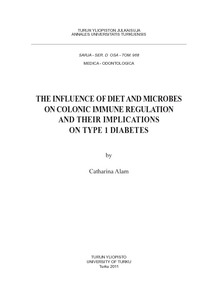The Influence of Diet and Microbes on Colonic Immune Regulation and their Implications on Type 1 Diabetes
Alam, Catharina (2011-06-17)
The Influence of Diet and Microbes on Colonic Immune Regulation and their Implications on Type 1 Diabetes
Alam, Catharina
(17.06.2011)
Annales Universitatis Turkuensis D 968 Turun yliopisto
Julkaisun pysyvä osoite on:
https://urn.fi/URN:ISBN:978-951-29-4652-5
https://urn.fi/URN:ISBN:978-951-29-4652-5
Kuvaus
Siirretty Doriasta
ei tietoa saavutettavuudesta
ei tietoa saavutettavuudesta
Tiivistelmä
Dietary and microbial factors are thought to contribute to the rapidly increasing prevalence of T1D in many countries worldwide. The impact of these factors on immune regulation and diabetes development in non-obese diabetic (NOD) mice are investigated in this thesis.
Diabetes can be prevented in NOD mice through dietary manipulation. Diet affects the composition of intestinal microbiota, which may subsequently influence intestinal immune homeostasis. However, the specific effects of anti-diabetogenic diets on gut immunity and the explicit associations between intestinal immune disruption and type 1 diabetes onset remain unclear.
The research presented herein demonstrates that newly weaned NOD mice suffer from a mild level of colitis, which shifts the colonic immune cell balance towards a proinflammatory status. Several aberrations can also be observed in the peritoneal B cells of NOD mice; an increase in activation marker expression, increased trafficking to the pancreatic lymph nodes and significantly higher antigen presenting cell (APC) efficiency towards insulin-specific T cells. A shift towards inflammation is likewise observed in the colon of germ-free NOD mice, but signs of peritoneal B cell activation are lacking in these mice. Remarkably, most of the abnormalities in the colon, peritoneal macrophages and the peritoneal B cell APC activity of NOD mice are abrogated when NOD mice are maintained on a diabetes-preventive, soy-based diet (ProSobee) from the time of weaning.
Dietary and microbial factors hence have a significant impact on colonic immune regulation and peritoneal B cell activation and it is suggested that these factors influence diabetes development in NOD mice.
Diabetes can be prevented in NOD mice through dietary manipulation. Diet affects the composition of intestinal microbiota, which may subsequently influence intestinal immune homeostasis. However, the specific effects of anti-diabetogenic diets on gut immunity and the explicit associations between intestinal immune disruption and type 1 diabetes onset remain unclear.
The research presented herein demonstrates that newly weaned NOD mice suffer from a mild level of colitis, which shifts the colonic immune cell balance towards a proinflammatory status. Several aberrations can also be observed in the peritoneal B cells of NOD mice; an increase in activation marker expression, increased trafficking to the pancreatic lymph nodes and significantly higher antigen presenting cell (APC) efficiency towards insulin-specific T cells. A shift towards inflammation is likewise observed in the colon of germ-free NOD mice, but signs of peritoneal B cell activation are lacking in these mice. Remarkably, most of the abnormalities in the colon, peritoneal macrophages and the peritoneal B cell APC activity of NOD mice are abrogated when NOD mice are maintained on a diabetes-preventive, soy-based diet (ProSobee) from the time of weaning.
Dietary and microbial factors hence have a significant impact on colonic immune regulation and peritoneal B cell activation and it is suggested that these factors influence diabetes development in NOD mice.
Kokoelmat
- Väitöskirjat [3084]
